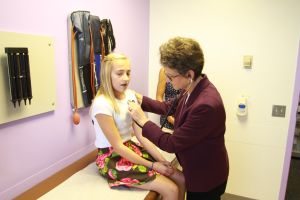With cold and flu season quickly approaching, and allergy season already upon us, doctors at Nationwide Children’s Hospital remind parents to take simple action steps that will protect their asthmatic children from having severe flare-ups. Parents may not realize it, but even something as simple as the common cold, when combined with asthma, can be dangerous for children with asthma.
“All it takes is one trigger – a common cold, a change in the weather, allergens that kids are exposed to, cigarette smoke – any of those things might trigger already-irritated airways to become even more agitated,” said Beth Allen, MD, a physician in Pulmonary Medicine at Nationwide Children’s Hospital. “Actually, colds are the number one thing that land kids with asthma in the hospital. They’ll come down with a cold, start having a cough on day two, and by day three, they’re pretty sick and can experience a severe asthma flare-up.”
That’s why, like clockwork during this time of year, Nationwide Children’s sees a spike in the number of asthma cases that present to the emergency department, urgent care centers and hospital admissions.
“We suspect that this spike is due to a variety of factors,” said Dr. Allen, also a faculty member at The Ohio State University College of Medicine. “During the summer, asthma tends to be less severe, and some families may not always regularly use controller therapies for their children. But with allergens that come into play during the fall, the weather changing, and kids catching more colds as they’re back in the classroom, it all combines for a perfect storm of asthma flare-ups.”
In fact, Dr. Allen says that 30 percent of the kids who are admitted to the hospital with the flu also have asthma. So these children are at an increased risk, if they get flu, to get quite ill not only with their asthma but also with pneumonia.
Doctors at Nationwide Children’s remind parents of important steps to take this fall to protect their asthmatic children from experiencing severe flare-ups:
- Have your child get a flu shot. This will give the child’s immune system a head start in battling any viruses they might encounter this fall. That is extremely important to get a flu shot, given how much time kids spend indoors and around other children who might be ill at school.
- Take your child in for a fall asthma check-up. Since asthma attacks tend to spike for many patients in the fall, it’s a good idea to get the child checked out, just so parents know the status of their child’s condition during the most challenging time of year. If your child is prescribed a daily asthma controller medication, make sure they keep taking it, even if they feel well.
- Work with your child’s doctor to develop a written action plan. Children with asthma already have an immune system that is dealing with one disease, so even a simple cold can turn into a serious issue in a matter of days. How prepared parents are to deal with different scenarios could make a big difference in the health of the child.
“Parents should be able to recognize the symptoms, know which medicines to use if they develop, and know when to call the doctor if that medicine is failing,” said Dr. Allen, who is also director of the fellowship-training program in pediatric pulmonology at Nationwide Children’s. “Ideally, they should walk away from a doctor’s visit with this all written down in what we call an asthma action plan.”

During the fall months, Nationwide Children’s sees a spike in the number of asthma cases that present to our facilities.
